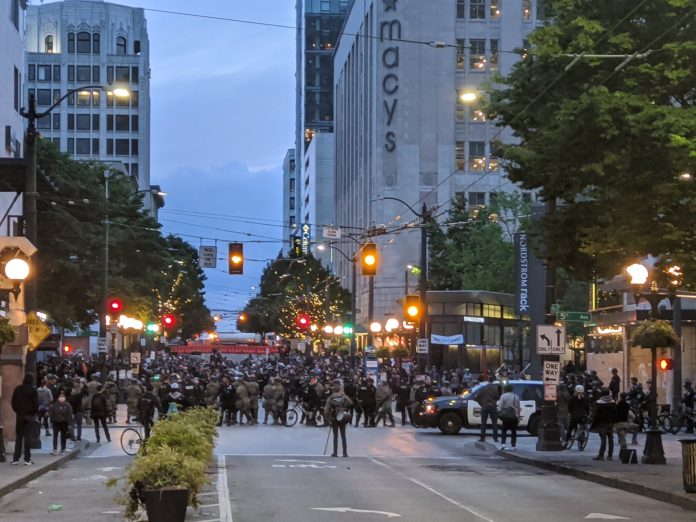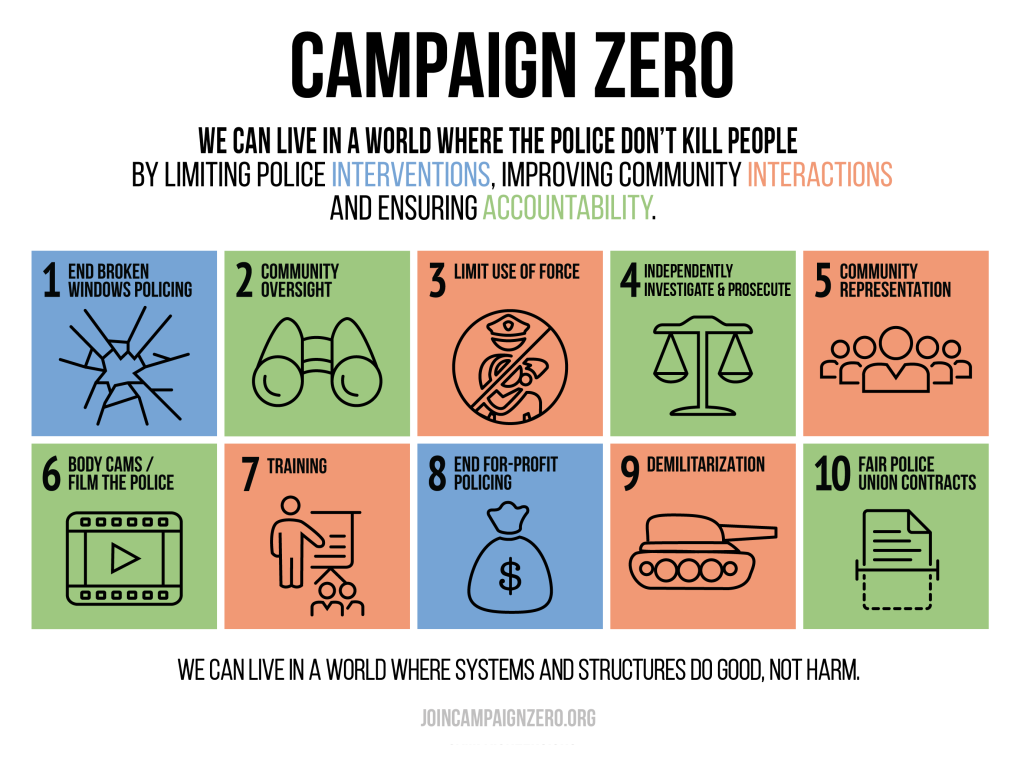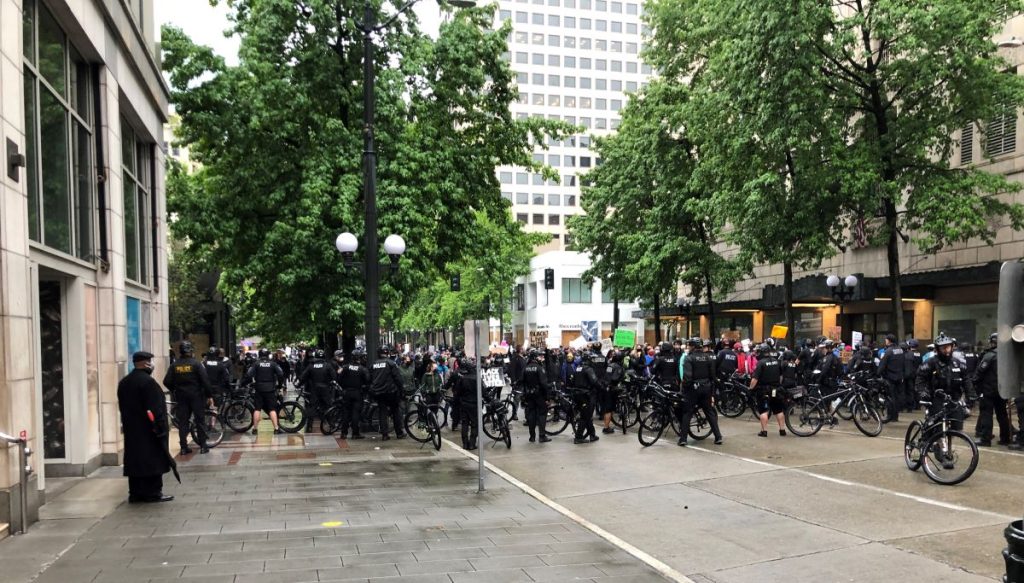
Cities across America are on edge right now. Many have seen clashes between police and protesters, resulting in injuries, arrests, and destruction. It was hard to focus on much of anything else as news feeds were inundated with images of violence–police in riot gear, cars on fire, and protesters taking beatings.
George Floyd’s murder in Minneapolis was the spark but America was a giant powder keg with every city having its own example of wanton police killings, brutality, and police reform thwarted by feckless politicians and a deeply entrenched system.
Seattle Police have killed two people this month–one in Columbia City and one in Interbay–but neither case blew up like Floyd’s murder, which was incredibly heinous and caught on cell phone preventing police from controlling the narrative. So it was the spark from Floyd’s murder that ignited our smoldering powder keg in Seattle, with efforts to defuse it going awry.
On Thursday, Mayor Jenny Durkan demanded justice for Floyd and urged prosecution of the police officers involved, but presented Seattle’s progress on reform in contrast. However, by Saturday she was sending police and the national guard after her own citizens and imposing a 5pm curfew with no notice and a march in progress. It’s a little more chaotic than most, but we’ve seen this story before.
So what do we do to break free of this cycle of violence: police killing, protest, yet more violence as police crackdown on protests, and repeat? Campaign Zero, which is an arm of Black Lives Matter, has some policy recommendations. First among them is ending broken windows policing, which seems to be making a bit of a comeback under Mayor Durkan. (Incidentally, after a riot, it’s the broken windows that centrist leaders focus our attention on and lament most of all.)

Also on the list are adding community oversight of police conduct, limiting the use of force, demilitarization, and independent investigation and prosecution of misconduct. Unfortunately, winning those reforms has proven elusive in Seattle and many jurisdictions nationwide.
The goal of greater police accountability and meaningful civilian oversight sounds simple enough but the politics are complicated. The police union (Seattle Police Officers Guild or SPOG) doesn’t want civilian oversight and they oppose measures that increase accountability. And since SPOG is a member of the MLK County Labor Council, labor leaders have defended police bargaining rights rather than focus energies on holding police accountable to the public (the irony given the council’s name is unfortunate).
Moreover, police seem to equate accountability and criticism to disrespect and complain to the press, blaming reform advocates and Seattle City Councilmembers for their low job satisfaction. As of the 2010 census, more than 80% of Seattle police officers resided outside city limits, which seems to exacerbate the divide and accentuate the department’s siege mentality. Police officer retention is a challenge.
Mayor Jenny Durkan caved to their demands in 2018 police contract negotiations, weakening the limited civilian oversight that was recently won, thanks in part to the federal consent decree Seattle Police Department (SPD) came under in 2012 due to a pattern of excessive use of force and misconduct. Mayor Durkan, though she helped (at least outwardly) as a U.S. Attorney to establish the consent decree, is now rushing to get Seattle out of it even though U.S. District Judge James Robart has said SPD isn’t ready. A Republican administration may be more likely to grant her wish given their thirst for tough policing and aversion to reform. Lifting Seattle’s consent decree isn’t an example of resisting Trump, but of collaborating with him.

During the protests, we saw police (apparently with the Mayor’s blessing) put into action a system that seems designed to shield them from responsibility. Many officers covered up their badges with black tape or bands to make it harder to identify them via their badge number despite regulations against obscuring police identification. After the fact, Mayor Durkan and Police Chief Carmen Best said this was part of a ritual to mourn fellow officers who have passed away, but it’s hard to excuse the timing or lack of intervention to reduce the practice.
Even worse, police did not turn on their body cameras during the protest and claimed that was out of deference to the rights of protesters. Here’s Mayor Durkan’s response to why that was:
Seattle has a long standing law and culture of not believing that police surveillance is appropriate. And before and police inappropriately gathering intelligence on lawful and peaceful demonstrations is prohibited. And so police department, we do not turn the body cameras on unless we think there’s going to be criminal activity or they have to take actions as a police officer, our, our policies are written and were well thought out they were developed with the assistance of a number of people, because we do not want people to believe that police are there to surveil and record lawful protests. And so the body cameras were not on, not to hide what was happening but to respect the right of the protesters.
Mayor Durkan
SPD decided that the protest had turned violent almost immediately, preemptively deployed flash bangs and pepper spray, and requested an immediate curfew declaration that technically made the demonstration illegal, but still didn’t turn on their body cameras. For what it’s worth, SPD circulated another excuse that the battery life is actually fairly short on the body cameras and recharging in the field, hence why even bother.
Thus, Seattle is left in a situation where many police officers have obscured their identities, turned off their body cameras, and are being let loose with an arsenal of rubber bullets, tear gas, mace, flash grenades, night sticks, assault rifles, and so on. Unaccountable police armed to the teeth at a protest demanding police accountability. What could go wrong?
Of course, many media sources including local TV news outlets have framed the story as protests turning violent and police restoring order and defending themselves. Accounts not fed through the police PR machine seem to dispute this. Nonetheless, commentaries are already being written that the protests backfired, damaged the cause, and tarnished the legacy of Dr. Martin Luther King Jr. American history–skewed as it is by racism–emphasizes King’s belief in nonviolent protest and even wields it as an impossible standard at times–all while ignoring his radical visions for criminal justice reform, economic justice, redistributing wealth, and human solidarity.
Martin Luther King wasn’t in the business of condemning protestors. “A riot is the language of the unheard,” he famously said. The full quote from King’s “Other America” speech at Stanford is so achingly prescient and relevant that I have to reproduce it here.
I think America must see that riots do not develop out of thin air. Certain conditions continue to exist in our society which must be condemned as vigorously as we condemn riots. But in the final analysis, a riot is the language of the unheard. And what is it that America has failed to hear? It has failed to hear that the plight of the Negro poor has worsened over the last few years. It has failed to hear that the promises of freedom and justice have not been met. And it has failed to hear that large segments of white society are more concerned about tranquility and the status quo than about justice, equality, and humanity. And so in a real sense our nation’s summers of riots are caused by our nation’s winters of delay. And as long as America postpones justice, we stand in the position of having these recurrences of violence and riots over and over again. Social justice and progress are the absolute guarantors of riot prevention.”
Rev. Martin Luther King, Jr.
After blaming the violence and looting on White men–particularly from out of state without presenting evidence supporting that–Mayor Durkan said the protests haven’t caused her to change her priorities in police union contract negotiations. It sounds like the rioters for police reform are still going unheard. Mayors across the nation are blaming the violence in their city on people from elsewhere as if there was a mythical anarchist homeland that is a root of all their problems. Critics like former Seattle Mayoral candidate Nikkita Oliver call this victim blaming and gaslighting.
As an urbanist, I believe good urbanism–quality housing for all, walkable streets, rapid transit, and lovely park spaces–can profoundly improve communities and aid in the fight against climate change. But it will all be for nothing if we don’t get police reform right so that people of all races and ethnicities can live in safety and in peace. To attempt to build a utopia without grappling with racism would be doomed from the start.
If you have the financial resources to spare, donate to groups on the frontlines like Northwest Bail Fund, Black Lives Matter, and Spokane Black Lens (hat tip to Kamau Chege for that last one).
Doug Trumm is publisher of The Urbanist. An Urbanist writer since 2015, he dreams of pedestrian streets, bus lanes, and a mass-timber building spree to end our housing crisis. He graduated from the Evans School of Public Policy and Governance at the University of Washington in 2019. He lives in Seattle's Fremont neighborhood and loves to explore the city by foot and by bike.

